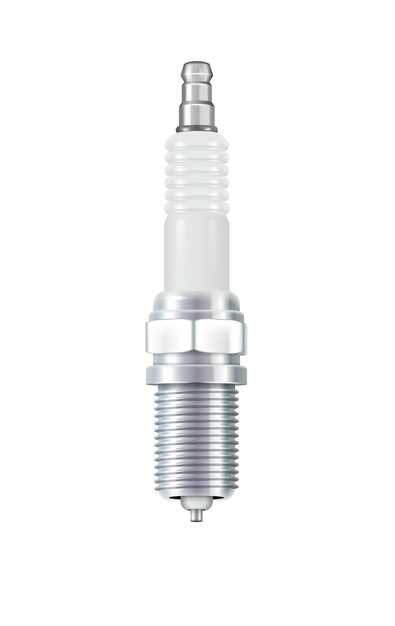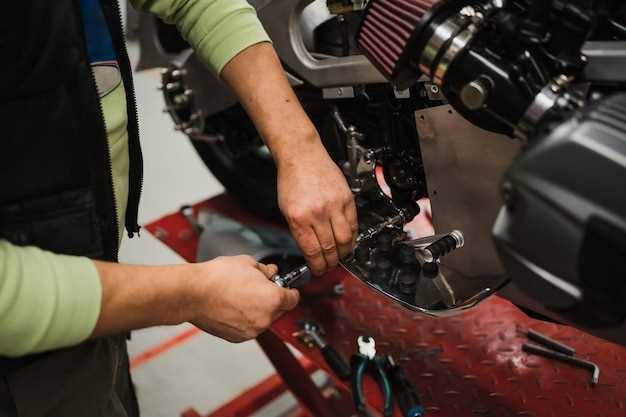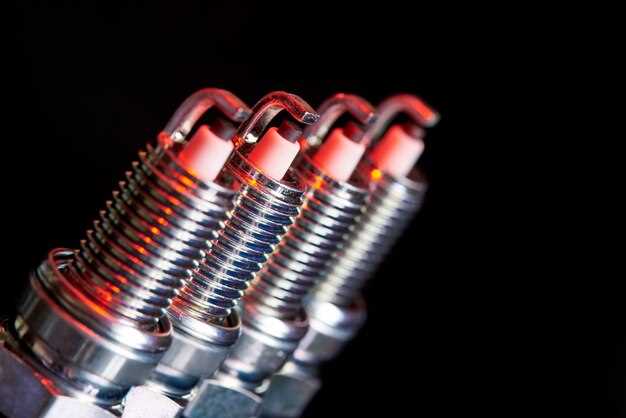
The performance and efficiency of an internal combustion engine are influenced by a multitude of factors, among which the role of spark plugs cannot be overlooked. Spark plugs are essential components that initiate the ignition process, igniting the air-fuel mixture within the engine cylinders. This ignition is pivotal for generating the power required to propel the vehicle, making the choice and condition of spark plugs crucial for optimal engine function.
Modern spark plugs come in various designs and materials, each tailored to enhance ignition efficiency and reliability. They must withstand extreme conditions, including high temperatures and pressures, while providing consistent performance over their lifespan. A well-functioning spark plug ensures a complete and timely ignition process, which directly affects engine power output, fuel efficiency, and emissions. In contrast, faulty or worn-out plugs can lead to misfires, reduced power, and increased fuel consumption, illustrating their critical role in maintaining engine health.
Understanding the connection between spark plugs and overall engine performance allows vehicle owners and enthusiasts to make informed decisions regarding maintenance and upgrades. By prioritizing high-quality ignition components, one can achieve not only better efficiency but also a smoother and more responsive driving experience. Investing in the right spark plugs can unlock the full potential of an engine, making it essential to recognize their impact on performance and efficiency.
How Spark Plug Design Influences Ignition Timing

The design of spark plugs plays a crucial role in determining ignition timing, which directly affects engine performance and efficiency. Ignition timing refers to the specific moment when the spark plug creates a spark to ignite the air-fuel mixture within the combustion chamber. An optimal ignition timing ensures that the engine performs at its peak efficiency and delivers the right amount of power.
Several design characteristics of spark plugs can affect ignition timing, including the electrode configuration, thermal characteristics, and material composition. These factors can influence the stability and timing of the spark, impacting the combustion process.
| Design Feature | Impact on Ignition Timing |
|---|---|
| Electrode Design | A finer electrode gap typically allows for quicker ignition, improving timing accuracy. |
| Insulator Material | High-performance materials can reduce heat dissipation, maintaining optimal spark energy for precise timing. |
| Electrode Shape | Different shapes can affect the spark’s behavior, enhancing or degrading early ignition based on design. |
| Heat Range | Choosing the right heat range helps prevent pre-ignition, allowing for more reliable ignition timing under varying conditions. |
Furthermore, variations in spark plug design also impact engine responses under load. A poorly designed spark plug may cause delayed ignition, resulting in decreased engine performance, increased emissions, and potential engine knocking. Conversely, a well-engineered spark plug facilitates a swift and consistent ignition process, optimizing the combustion cycle and enhancing overall efficiency.
In conclusion, the interplay between spark plug design and ignition timing is a fundamental aspect of engine dynamics. Understanding these relationships allows manufacturers and engineers to create spark plugs that maximize engine performance while ensuring reliable ignition control across various driving conditions.
The Role of Spark Plug Materials in Engine Durability
The materials used in spark plug construction play a critical role in determining engine durability and performance. Different materials affect how well the spark plug can withstand the extreme conditions of combustion, impacting ignition efficiency and overall engine function.
Traditionally, spark plugs have been made from materials like copper, platinum, and iridium. Copper spark plugs offer excellent conductivity and quick heat dissipation, which contribute to effective ignition. However, they tend to wear out faster than their platinum or iridium counterparts, resulting in diminished performance over time.
Platinum spark plugs provide a longer lifespan due to their higher melting point and resistance to erosion. Their ability to maintain consistent spark generation over time enhances ignition performance, thus promoting better engine efficiency. This durability translates to less frequent replacements and improved reliability, essential for long-term engine health.
Iridium spark plugs are at the forefront of spark plug technology. They feature a very fine tip, which helps produce a stronger spark while requiring lower voltage to ignite the air-fuel mixture. This material’s hardness and high melting point significantly extend the spark plug’s life, ensuring that the ignition system remains effective throughout the engine’s service period, ultimately contributing to enduring engine durability.
In conclusion, the choice of spark plug materials is integral to maximizing engine durability. Selecting the appropriate spark plug can lead to improved ignition performance and efficiency, ensuring that the engine operates smoothly over a longer lifespan. Understanding the material characteristics helps in making informed decisions that enhance overall engine performance.
Identifying Signs of Worn or Faulty Spark Plugs
Worn or faulty spark plugs can significantly impact engine performance and efficiency. Recognizing the signs early can save time and money by preventing further damage to the ignition system and the engine itself.
One of the most common indicators of faulty plugs is difficulty starting the engine. If the engine struggles to turn over or requires multiple attempts to ignite, it may signal that the spark plugs are not functioning optimally. Poor performance during acceleration is another warning sign; if the engine hesitates or misfires, it could be due to weak or inconsistent ignition caused by worn plugs.
Rough idling is also a key symptom of spark plug issues. A smoothly running engine should idle steadily, but if the vibrations are noticeable and the engine feels uneven, it may be time to inspect the plugs. Additionally, a noticeable decrease in fuel efficiency can occur. If drivers experience more frequent trips to the gas station without any changes in driving habits, this can be a sign that the ignition system is not performing efficiently.
Another telltale sign is the appearance of spark plugs themselves. Visually inspecting the plugs for wear can provide insights into their condition. If the electrodes show pronounced wear, carbon buildup, or oil deposits, they may need replacement. Normal plugs should have a light tan or gray color, while black, sooty plugs indicate improper combustion.
In conclusion, recognizing these signs–starting issues, performance hesitations, rough idling, decreased fuel efficiency, and abnormal wear–can help maintain optimal engine operation. Regular inspection and timely replacement of spark plugs are crucial for ensuring a healthy and efficient ignition system.
Recommendations for Choosing the Right Spark Plug Type
Selecting the appropriate spark plug type is crucial for optimizing engine performance and achieving efficient ignition. The right choice depends on several key factors, including the engine design, driving conditions, and personal preferences.
First, consider the engine specifications. Consult the vehicle’s owner manual for manufacturer recommendations. Different engines may require specific spark plug types, such as copper, platinum, or iridium, based on their ignition systems and operating temperatures. Each material has distinctive properties that affect longevity and heat conductivity, influencing overall performance.
Next, assess your driving habits. If you frequently engage in high-performance driving, iridium plugs may provide better performance due to their superior spark capability and longevity. Conversely, for standard driving conditions, copper plugs may suffice, as they offer a cost-effective solution while still delivering reliable ignition.
Additionally, evaluate environmental factors. Cold climates can affect spark plug performance, requiring plugs designed to operate effectively under lower temperatures. Hotter climates, on the other hand, may necessitate plugs that can withstand higher heat levels without causing engine knock or misfires.
Another essential aspect is the spark plug gap. Ensure that the gap matches your engine’s specifications for optimal ignition and combustion efficiency. An incorrect gap can lead to poor engine performance, increased fuel consumption, and unnecessary emissions.
Lastly, consider the brand and quality of the spark plug. Opt for reputable manufacturers that have a proven track record in producing high-quality ignition components. Investing in reliable spark plugs will yield better engine performance and extend the engine’s lifespan.
How Spark Plugs Affect Fuel Economy and Emissions

Spark plugs play a critical role in the ignition process of internal combustion engines. Their performance directly influences fuel economy and emissions levels. Understanding this relationship is essential for optimizing engine efficiency and reducing environmental impact.
Key factors include:
- Ignition Timing: Properly functioning spark plugs ensure that the air-fuel mixture ignites at the correct time, creating maximum pressure within the cylinder. This efficiency translates to better fuel economy.
- Spark Quality: High-quality spark plugs create a strong and consistent spark, promoting complete combustion. Incomplete combustion can lead to unburned fuel, increasing fuel consumption and harmful emissions.
- Electrode Condition: Worn or fouled electrodes can weaken the spark. This can lead to misfires, which diminish efficiency and elevate fuel usage, resulting in higher CO2 and other emissions.
To enhance fuel economy and minimize emissions, consider the following:
- Regular Maintenance: Periodic inspection and replacement of spark plugs will maintain optimal ignition performance.
- Choosing the Right Spark Plug: Selecting the appropriate type of spark plug for your engine can significantly impact performance. Consult manufacturer specifications for compatibility.
- Monitor Engine Performance: Keep an eye on engine behavior. Increased fuel consumption or unusual emissions can be an indicator of spark plug issues.
In conclusion, spark plugs are vital for ensuring efficient fuel combustion. By maintaining their performance, drivers can achieve better fuel economy and reduce emissions, contributing to an overall reduction in environmental impact.
Best Practices for Spark Plug Maintenance and Replacement
Proper maintenance and timely replacement of spark plugs are crucial for optimal engine performance and efficiency. Regularly checking the condition of spark plugs can prevent ignition issues and improve fuel economy.
One of the best practices is to follow the manufacturer’s recommendations for replacement intervals, typically found in the owner’s manual. Many modern vehicles can go 30,000 to 100,000 miles between changes, depending on the type of spark plug used.
Another essential aspect is to inspect the spark plugs periodically. Look for signs of wear, such as erosion of the electrodes or excessive carbon buildup. A clean and properly functioning spark plug ensures reliable ignition, contributing to smoother engine operation.
When replacing spark plugs, use the correct type and specifications as recommended. Utilizing the appropriate heat range and gap size is vital for effective ignition and performance. Installing mismatched spark plugs can lead to misfires and decreased efficiency.
Additionally, ensure that the spark plug threads and sealing surfaces are clean before installation. This practice helps maintain proper compression and reduces the risk of leaks, ensuring that the ignition process is efficient.
Lastly, consider using anti-seize compound on the threads of spark plugs to prevent them from seizing in the cylinder head. However, avoid using it on the electrodes, as this can affect ignition performance. Regular maintenance and timely replacement will ensure that your engine remains efficient and performs optimally.
